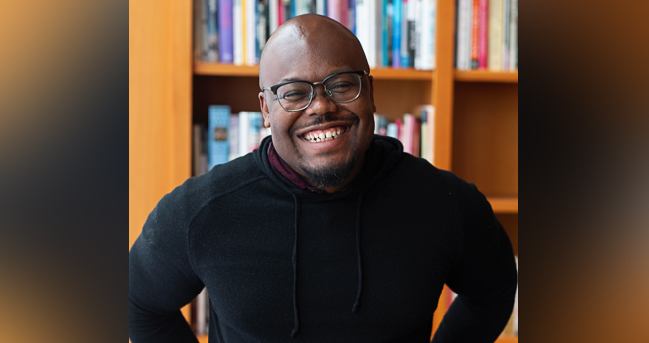Lucas Johnson is part of the leadership team for the “The On Being Project.” He earned his bachelor’s degree in Christianity with minors in political science and French at Mercer. He also holds a Master of Divinity degree from Emory University’s Candler School of Theology and is an ordained minister.
Here are five things to know about Johnson:
1. He’s a world traveler.
Johnson was born in Erlangen, Germany, where his father was stationed with the Army. His family moved to Hinesville, Georgia, when he was 8 years old and remained there until he went to Mercer.
He now lives in Amsterdam for most of the year, but he travels frequently for work. He stops in Minneapolis, where “On Being” is headquartered, several times a year and visits New York and Georgia often.
2. He’s grateful for his time at Mercer.
Beloved faculty member “Papa Joe” Hendricks gave the welcome address when Johnson was a freshman and set the tone for his four years at Mercer.
“The Mercer that he introduced us to was a sacred place, a community of intellectual discovery, a place that nurtured integrity and encouraged moral wrestling and growth,” Johnson said. “I felt both nurtured and challenged by a community that seemed committed to a common sense of purpose.”
He was shown support by everyone from cafeteria and groundskeeping staff to administrators and professors. He was able to develop as a leader through experiences with student government, his fraternity and campus life.

3. He has followed his calling through a variety of opportunities.
Johnson said he felt a “sense of vocation at the intersection of faith and public life” after graduating from Mercer, and he gradually discovered how to apply that passion.
He interned at the Baptist Joint Committee for Religious Liberty in Washington, D.C.; took an AmeriCorps VISTA assignment with Macon Area Habitat for Humanity; volunteered and helped with homeless initiatives at Centenary United Methodist Church in Macon; and became involved in the Baptist Peace Fellowship of North America and the Fellowship of Reconciliation (FOR) while enrolled at Emory’s Candler School of Theology.
During seminary, he was also able to take classes on international human rights law and Islamic law and study abroad in Germany for a year. He said he felt a strong calling to serve people “as they confronted the structural and social challenges that stood in the way of human dignity and human flourishing.” It was a natural fit for him to join the staff at FOR, and he later was promoted to its international leadership team.
4. He has worked with “The On Being Project” since November.
“The On Being Project” produces a public radio show, podcasts and other materials. Johnson is part of the nonprofit’s leadership team and is executive director of the Civil Conversations Project, where he supports projects that focus on how communities can tackle modern social issues.
“I think it is critical that we foster environments where questions of meaning and the moral complexities of common life are given the space in our public life that they deserve,” he said. “As a media and public life initiative, we are trying to nurture the development of better ways of being in conversation and being in community.”
5. Human rights work is very important to him.
Johnson did most of his human rights projects with FOR and worked closely with Geneva representatives for the United Nations’ Human Rights Council and Human Rights Committee. He has done international advocacy work related to conscientious objection to military service; rights of migrants and refugees; international conventions against racism and discrimination; human rights concerns in Colombia, South Sudan and Western Sahara; and issues of violence on the basis of gender, gender identity and sexual orientation.
“I think there are a lot of us in the U.S. who are so used to strong institutions that protect basic rights and freedoms that we forget that those institutions are dependent both on a cultural ethos and political will that support them,” he said. “As a black American and a son of parents who grew up in segregated schools, I grew up with an awareness that basic rights were not something that populations can just assume others will recognize or protect.”










